英语六年级一般疑问句课件【优质PPT】
合集下载
小学英语一般疑问句PPT课件
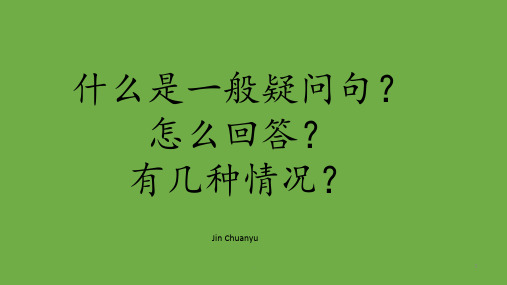
1. ___________________________________?
Yes, there is a bookstore next to the school.
2. ____________________________________?
Yes, there are some pandas in the mountains.
Do you go to bed at nine o’clock?
.
4
5 I will go back in two days.
Will you go back in two days?
6 He can play football. Can he play football?
7 The children are singing.
1 be动词: am, is, are, was, were
2 情态动词: can, may,will,must ,shall,should,could, might, would,need, …
3 助动词: do does did has/have(已经)
注意:
some在否定句, 疑问句中 要变成 any
4. Can your mother play the pipa?
No, _______ _______.
5 .May I have a look?
_____, ______ ______ ______(肯. 定)
9
二、根据图片回答问题.
1Are you watching TV? _________________.
2.Is he short and strong? ___________________.
疑问句(课件)六年下册英语人教PEP版
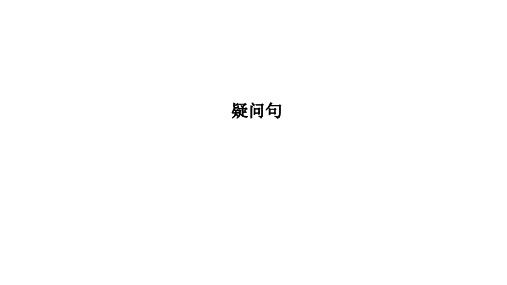
疑问句
一、 一般疑问句 一般疑问句主要有以下几种形式: 1. 句子谓语动词是be动词时:
2. 句子谓语含有情态动词时: 如:Can you dance? 你会跳舞吗?(肯定回答:Yes, I can. 否定回答:No, I can’t.)
3. 句中谓语动词是行为动词: 如:Do you often play sports on the weekend? 你经常在周末做运动吗? (肯定回答:Yes, I do. 否定回答:No, I don’t.)
问句不用Yes或No回答,要根据实际情况选择一种情况作为回答。选择疑问 句要用or连接,朗读时or前面的部分用升调,or后面的部分用降调。
选择疑问句有以下结构: 1. 一般疑问句+or+可选择部分。 如: Do you like mutton or beef? 你喜欢羊肉还是牛肉?
2. 特殊疑问句+可选择部分+or+可选择部分。 如:Who is taller, Lucy or Lily? 露西和莉莉谁更高? 3. 一般疑问句+or not。 如:Would you like to go with me or not? 你愿不愿意跟我去?
—I go to school at 7:30. 2.— Where are Jack and Tom?
—They are behind you. 3.— Who haoes Nancy go to school?
—On foot.
who how much where when what how whose what colour which why Why
How much Whose What colour Which What
三、给下列句子选择合适的答语。 ( C )1.What’s wrong? ( A )2.What’s your favourite food? ( B )3.Can you do any kung fu? ( E )4.Where are you going? ( D )5.Would you like a cup of tea?
一、 一般疑问句 一般疑问句主要有以下几种形式: 1. 句子谓语动词是be动词时:
2. 句子谓语含有情态动词时: 如:Can you dance? 你会跳舞吗?(肯定回答:Yes, I can. 否定回答:No, I can’t.)
3. 句中谓语动词是行为动词: 如:Do you often play sports on the weekend? 你经常在周末做运动吗? (肯定回答:Yes, I do. 否定回答:No, I don’t.)
问句不用Yes或No回答,要根据实际情况选择一种情况作为回答。选择疑问 句要用or连接,朗读时or前面的部分用升调,or后面的部分用降调。
选择疑问句有以下结构: 1. 一般疑问句+or+可选择部分。 如: Do you like mutton or beef? 你喜欢羊肉还是牛肉?
2. 特殊疑问句+可选择部分+or+可选择部分。 如:Who is taller, Lucy or Lily? 露西和莉莉谁更高? 3. 一般疑问句+or not。 如:Would you like to go with me or not? 你愿不愿意跟我去?
—I go to school at 7:30. 2.— Where are Jack and Tom?
—They are behind you. 3.— Who haoes Nancy go to school?
—On foot.
who how much where when what how whose what colour which why Why
How much Whose What colour Which What
三、给下列句子选择合适的答语。 ( C )1.What’s wrong? ( A )2.What’s your favourite food? ( B )3.Can you do any kung fu? ( E )4.Where are you going? ( D )5.Would you like a cup of tea?
小学英语语法课件-疑问句 (共29张PPT) 全国通用
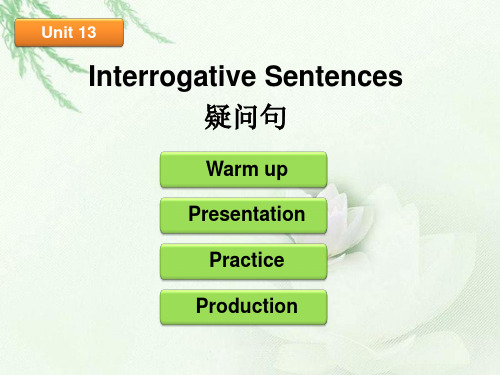
Presentation Grammar Box
Presentation Grammar Box
Presentation Grammar Box
Presentation Grammar Box
Presentation Grammar Box
Presentation Grammar Box
A. What
B. When
C. Where
D. Which
Production Quiz
Production Quiz
Practice Oral Practice
选择正确的答语。
A. By car. B. Yes, she has. C. Yes, I do. D. It’ s 10 dollars. E. He is my brother.
( E) 1. Who is he? ( A) 2. Do you go home by car or by subway?
Practice
Exercise 2
aren't you
Practice
Exercise 3
Practice
Exercise 4
5
PPrraaccttiicceeI Exercise 1
特殊疑问句 一般疑问句 一般疑问句 一般疑问句 反意疑问句
Practice
Exercise 2
aren't you didn’t she
My grandma has been to many places, _h_a_s_n_’_t _s_h_e_? Lily and Lucy will go to school next week, _w__o_n_’_t _th_e_y__?
小学英语语法一般疑问句和特殊疑问句PPT课件

2、如句子里是动词就在这些词前加 don't,doesn't,didn't
(1)主语是第一、二人称(复数)加don’t,第三人称单数加
doesn't
(2)如果是过去式就加didn't
例:I like dogs.
She likes swimming.
I don‘t like dogs.
She doesn’t like swimming.
A How B Where C What D Who
3.A: Was this book in the desk?
B: ___D____
A Yes,it is. B No,it was C Yes,it wasn’t D No,it wasn’t
4.A: ____A___ heavy is John?
Thank You !
e.g经营者提供商品或者服务有欺诈行为的,应当按照消费者的要求增加赔偿其受到的损失,增加赔偿的金额为消费者购买商品的价款或接受服务的费用
This is Amy's bike.(一般疑问句) Is this Amy's bike? Yes, this is. (肯定回答) No, this isn't. (否定回答) Did you go to Beijing last weekend? Yes, I did. (肯定回答) No, I didn't. (否定回答) I have some books. (一般疑问句) Do you have any books?
特殊疑问句
表示疑问,有疑问词(在开头),回答有很
多种可能。
常用疑问词:
When 什么时间 (问时间)
改一般疑问句ppt课件

17. May has got a doll.
Has May got a doll?
18. I have got some orange juice. Have you got any orange juice?
19. Spotty has got my hot dog. Has Spotty got your hot dog?
20. I have got a young sister. 21.She can run fast.
Have you got a young sister? Can she run fast?
22. He can dive.
Can he dive?
23. I can swim every day.
Can you swim every day?
24. Sam likes to eat pizzas.
Does Sam like to eat pizzas?
25. I live in Shanghai.
Do you live in Shanghai?
26. Kitty lives in Hangzhou.
Am I your mother? Are you Kitty? Is the apple red? Is the desk a square? Is the star yellow? Has she got any corn? Have you got a red pen?
16. You have got a red and yellow dress. Have I got a red and yellow dress?
Has his father got a nice shirt?
六年级英语班第11次课一般疑问句与特殊疑问句

• • • • • • • • • • • •
7 I go to bed at eight o’clock. Do you go to bed at eight o’clock? 8 Tom bought some presents on his holiday. Did Tom buy any presents on his holiday? 9 We have finished our homework. Have you finished your homework? 10 We had finished our homework. Had you finished your homework? 11 We/I have dogs. Do you have dogs? I had a dog. Did you have a dog?
Whose ball is this? • 8._____ It’s Jim’s. Where does he jog? • 9._____ He jogs in the park. Why are you late? • 10._____ Because I didn’t catch the bus.
• I want 5 paper . How many paper do you want ? • This T-shirt is 100 yuan. How much is this T-shirt ? • He is 14. How old is he?
一般疑问句的复习 • 一、根据问句作肯定回答或否定回答. 以be 动词(are, am, is, were, was)开头的一般疑问句。 • 1. Is Sarah sad today? Yes, ______ ______. • 2. Are you playing chess , John and Mike? No, _____ _____ . • 3. Is there a bookstore near the hospital? No, ______ ______ . • 4. Are there any pictures on the wall? Yes, _______ ______.
六年级下册英语一般疑问句与特殊疑问句

一般疑问句和特殊疑问句
Task1: 一般疑问句
Part one:
1.Is this a book? --Yes, it is. / No, it isn’t.
2.Can y用ou YplaEy Sba或skeNtbOall?来 --Yes, I回can答. /的No, I问can句’t.
3.Do yo就u lik是e 一hav般ing疑Eng问lish句cl。ass?
3.谓语动词是第三人称单数,在句首加Does,
动词用原形。
1) She has a small mouth. Does she have a small mouth?
2) Maria likes China. Does Maria like China?
3) Jane comes from the U.S.A. Does Jane come from the U.S.A?
练习
1.I can see a red building in the picture?
What can you合se作e 要in t求he:picture?
2.My brother will go with you.
Who will go 3.My father
wgoi1teh.s独ytoo立uh?完is c成om作p业any
How many
多少(修饰可数名词)
How much
多少(修饰不可数名 词);多少钱
How old
多大
How far
多远
How often
多久一次
How long
多长时间
How soon
多快
拓展练习:
• 1.My coat is black.
Task1: 一般疑问句
Part one:
1.Is this a book? --Yes, it is. / No, it isn’t.
2.Can y用ou YplaEy Sba或skeNtbOall?来 --Yes, I回can答. /的No, I问can句’t.
3.Do yo就u lik是e 一hav般ing疑Eng问lish句cl。ass?
3.谓语动词是第三人称单数,在句首加Does,
动词用原形。
1) She has a small mouth. Does she have a small mouth?
2) Maria likes China. Does Maria like China?
3) Jane comes from the U.S.A. Does Jane come from the U.S.A?
练习
1.I can see a red building in the picture?
What can you合se作e 要in t求he:picture?
2.My brother will go with you.
Who will go 3.My father
wgoi1teh.s独ytoo立uh?完is c成om作p业any
How many
多少(修饰可数名词)
How much
多少(修饰不可数名 词);多少钱
How old
多大
How far
多远
How often
多久一次
How long
多长时间
How soon
多快
拓展练习:
• 1.My coat is black.
通用小升初英语总复习一般疑问句和特殊疑问句讲解课件

Did they go to the Great Wall last year?
5. She felt upset about her weight.
Did she feel upset about her weight?
1.你是1995年诞生的吗? Were you born in 1995 ?
8.Are you eating lunch? 你(们)正在吃午餐吗? Yes, I am. / Yes, we are. 是的,我(们)正在吃。 No, I am not. / No, we aren't. 不,我(们)没有在吃。
9.Is he playing chess? 他正在下棋吗? Yes, he is. 是的,他是。/ No, he isn't. 不,他没有。
4.对指人名词或人称代词提问用who 例:Li Ping is my sister. —Who is Li Ping?
5.对物主代词和名词所有格提问用whose 例:Li Ping's coat—whose coat
my father—whose father
6.对具体时间提出疑问,疑问词用when;对具体几 点钟提问,用what time 例:It's 10:00. —What time is it?
• 问时间点
2. what colour
• 什么颜色
3. what weather
• 什么天气
4. 什么学科
• what subject
5. 多少
• How many/much
6. 多长
• How long:
7. 多少钱价格
• How much
8. 多少次(问频率) • How often
5. She felt upset about her weight.
Did she feel upset about her weight?
1.你是1995年诞生的吗? Were you born in 1995 ?
8.Are you eating lunch? 你(们)正在吃午餐吗? Yes, I am. / Yes, we are. 是的,我(们)正在吃。 No, I am not. / No, we aren't. 不,我(们)没有在吃。
9.Is he playing chess? 他正在下棋吗? Yes, he is. 是的,他是。/ No, he isn't. 不,他没有。
4.对指人名词或人称代词提问用who 例:Li Ping is my sister. —Who is Li Ping?
5.对物主代词和名词所有格提问用whose 例:Li Ping's coat—whose coat
my father—whose father
6.对具体时间提出疑问,疑问词用when;对具体几 点钟提问,用what time 例:It's 10:00. —What time is it?
• 问时间点
2. what colour
• 什么颜色
3. what weather
• 什么天气
4. 什么学科
• what subject
5. 多少
• How many/much
6. 多长
• How long:
7. 多少钱价格
• How much
8. 多少次(问频率) • How often
小学英语 变一般疑问句详细讲解课件
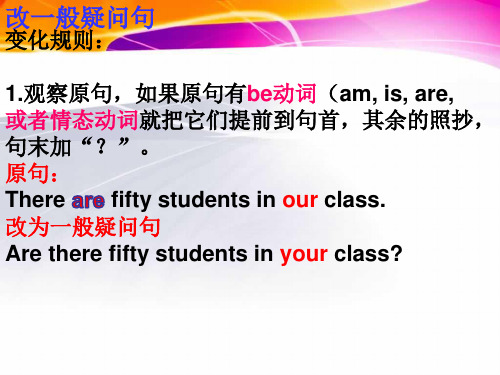
some 和any意思都是:一些 但是用法有区别。 some 用在肯定句,any用在否定句和疑问句。
There are some books in my bag.(肯定句) There are not any books in my bag.(否定句) Are there any books in your bag? (疑问句)
(5) Amy likes pears.
D_o__e_sAmy l_i_k_e_ ____ pears ?
改一般疑问句
变化规则:
2.如果句中没有be动词就用Do或Does。(动词是 原形用Do;动词是第三人称单数用Does; 原句: We like music. 改为一般疑问句 Do you like music? 原句 He likes art. 改为一般疑问句 Does he like art?
3.注意:改句时,第一人称改为第二人称:I am 改为 Are you; We are 改为 Are you; some改为any; do、does、后的动词改为原形。 句尾加问号。
把下列句子改为一般疑问句。
(1)I am a good student.
_A_r_e____ __y_o__u__ a good student?
(2) He can swim.
__C__a_n_____ __h__e______ swim?
(3) ngling _l_ik_e___ apples?
改一般疑问句
变化规则:
1.观察原句,如果原句有be动词(am, is, are, 或者情态动词就把它们提前到句首,其余的照抄, 句末加“?”。 原句: There fifty students in our class. 改为一般疑问句 Are there fifty students in your class?
六年级英语上册 英语一般疑问句的知识(课件)

肯定回答用“Yes, 主语+ do\does.”,
否定回答用“No, 主语+don\does not.”。助动词也常用缩写形式,主要 有don’t,doesn’t,didn’t等。
正如前面所述,回答一般疑问句
时有肯定回答和否定回答两种方 式,肯定回答以Yes起句,否定回 答用No开头。但对一般疑问句的 回答也不是一成不变的。肯定回 答还可以用OK./Certainly.等;否 定回答可用Sorry./Sorry,I can`t. 等。
be动词
词
即实义动词,表示动作的动词。
它分为及物动词和不及物动词 两种。实义动词有完全的词义, 并能独立做谓语动词。后面必 须跟宾语。意义完整的实义动 词,被称为及物动词。
助动词
协助主要动词构成谓语的词叫助动词
(Auxiliary Verb)。被协助的动词称 作主要动词(Main Verb)。助动词用 来构成时态和语态。 助动词具有语法 意义,但没有词汇意义,不可单独作 谓语。它没有对应的汉译,例如: He doesn't like English. 他不喜欢英语。 (does是助动词,无词义;like是主 要动词,有词义)
在一般疑问句中,要表达“一些”
时 ,一般用any,但如果这个问句 是用来表达 “建议、请求、邀请” 等交际功能时 ,应该用some.
八、用am is are can do does 各造一个 句子
情态动词
情态动词(Modal verbs)本身有一定的词义,表示 语气的单词。但是不能独立作谓语,只能和动词原 形一起构成谓语。情态动词用在行为动词前,表示 说话人对这一动作或状态的看法或主观设想。 情态 动词虽然数量不多,但用途广泛,主要有下列: can (could), may (might), must, need, ought to, dare (dared), shall (should), will (would) must not.情态动 词无人称和数的变化,情态动词后面跟的动词须用 原形,否定式构成是在情态动词后面加 "not"。个别 情态动词有现在式和过去式两种形式,过去式用来 表达更加客气,委婉的语气,时态性不强,可用于 过去,现在或将来。情态动词属非及物动词,故没 有被动语态。
小升初英语-Be动词引导的一般疑问句课件(共21张PPT)
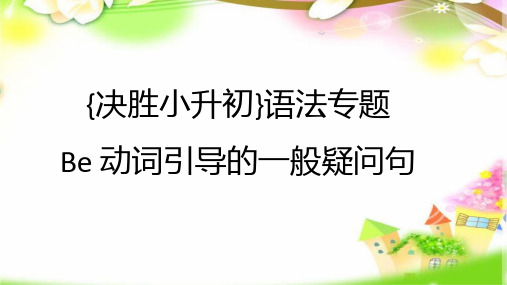
.
小试牛刀
Were they young then?
肯定回答:
Yes, they were
.
否定回答:
No, they weren't
.
小试牛刀
Are you feeling sad?
肯定回答:
Yes, I am
.
否定回答:
No, I'm not .
4.陈述句如何变成一般疑问句(1)
is a monster. Is a monster?
4.陈述句如何变成一般疑问句(5)
was five then. Were five then?
一二人称要互换,人称换了,对应的be动 词也要换。
Be动词用法口诀
“我”用am; I am “你”用are;You are is连着他她它,He is/She is/It is..; 但不可数用is, 复数名词都用are。
陈述句变一般疑问句方法:
1.Be动词提前; 2.其他内容不变,抄写下来,注意大小写; 3.一二人称要互换; 4.句末用问号。
5.小试牛刀
请将下列句子变成一般疑问句,并作答。 1.Amy was very cute then. 一般疑问句: Was Amy very cute then? 肯定回答: Yes, she was. 否定回答: No, she wasn't.
一般疑问句只有两种回答:
肯定回答:Yes,主语+Be动词的肯定式. 否定回答:No,主语+Be动词的否定式. 温馨提示:主语一般用代词:I,we,he,she,it,they... 当一般疑问句主语是第二人称时,回答要换成第一 人称:即“一二人称要互换”。
3.Be 动词引导的疑问句如何作答(3)
小学英语肯定句变一般疑问句ppt课件

3. I am from Canada. __A_r_e_ __y_o_u_ from Canada?
肯定回答:__Y_e_s__, __I _a_m_____ 否定回答:__N__o__, __I _‘m__n_o_t__
4. She is looking for her dog. __Is___ she __l_o_o_k_in__g__ for her dog?
“雪亮工程"是以区(县)、乡(镇) 、村( 社区) 三级综 治中心 为指挥 平台、 以综治 信息化 为支撑 、以网 格化管 理为基 础、以 公共安 全视频 监控联 网应用 为重点 的“群 众性治 安防控 工程” 。
中文解释什么是一般疑问句
1.你吃饭了吗?
肯定回答: 是的,我吃了
2.他睡觉了吗?
否定回答: 不,他没睡
2. She has to clean the classroom every day. _D_o_es__ she _h_a_v_e_ to clean the classroom every day?
肯定回答:__Y_e_s___, _s_h_e__d_o_es___ 否定回答:__N_o____, _s_h_e_d_o_e_s_n_’t_
否定回答:__N_o___, __I _d_o_n_’t____
4. We did morning exercises yesterday. _D__id__ you __d_o__ morning exercises yesterday?
肯定回答:_Y_e_s___, _w__e_d_i_d____ 否定回答:__N_o___, _w__e__d_id_n_’_t_
_W__e_r_e_ there _a_n_y___ birds in the tree two days ago?
肯定回答:__Y_e_s__, __I _a_m_____ 否定回答:__N__o__, __I _‘m__n_o_t__
4. She is looking for her dog. __Is___ she __l_o_o_k_in__g__ for her dog?
“雪亮工程"是以区(县)、乡(镇) 、村( 社区) 三级综 治中心 为指挥 平台、 以综治 信息化 为支撑 、以网 格化管 理为基 础、以 公共安 全视频 监控联 网应用 为重点 的“群 众性治 安防控 工程” 。
中文解释什么是一般疑问句
1.你吃饭了吗?
肯定回答: 是的,我吃了
2.他睡觉了吗?
否定回答: 不,他没睡
2. She has to clean the classroom every day. _D_o_es__ she _h_a_v_e_ to clean the classroom every day?
肯定回答:__Y_e_s___, _s_h_e__d_o_es___ 否定回答:__N_o____, _s_h_e_d_o_e_s_n_’t_
否定回答:__N_o___, __I _d_o_n_’t____
4. We did morning exercises yesterday. _D__id__ you __d_o__ morning exercises yesterday?
肯定回答:_Y_e_s___, _w__e_d_i_d____ 否定回答:__N_o___, _w__e__d_id_n_’_t_
_W__e_r_e_ there _a_n_y___ birds in the tree two days ago?
小升初复习肯定句变一般疑问句(课件)人教新起点版英语六年级下册

Can Lily play the pipa
4、I have PE and art on Fridays.
Do you have PE and art on Fridays
5、He ofen cleans the room on the weekend.
Does he often clean the room on the weekend
在句首加助动词 或 , 剩下的句子照抄, 末尾用问号。
一加 二变 三问号
句中动词是第 三人称单数形 式时,句首用 Does。
注意: 1、字母大小写的变化;
2、将原句中的动词变回原形。 3、有 变 ; 4、人称的变化:一变二,二变一(第一人称要变 为相应的第二人称,第二人称要变为相应的第一人 称)。
eg. We have English on Mondays. We have English on Mondays.
转换型 句
肯定句变一般疑问句
肯定句是什么?
一般疑问句是什么?
小学五年级:
肯定句变一般疑问句的规律
1 原句中含有be动词和情态动词时,
将be动词和情态动词提到句首, 剩下的句子照抄, 末尾用问号。
一提 二变 三问号
注意:1、字母大小写的变化;
2、有 变 ;
3、人称的变化:一变二,二变一(第一人称要变 为相应的第二人称,第二人称要变为相应的第一人 称)。
eg. There is a river in the park. Is tThere is a river in the park.
eg. I can do some kung fu. Can yIoucan do saonmye kung fu.
肯定句变一般疑问句的规律
4、I have PE and art on Fridays.
Do you have PE and art on Fridays
5、He ofen cleans the room on the weekend.
Does he often clean the room on the weekend
在句首加助动词 或 , 剩下的句子照抄, 末尾用问号。
一加 二变 三问号
句中动词是第 三人称单数形 式时,句首用 Does。
注意: 1、字母大小写的变化;
2、将原句中的动词变回原形。 3、有 变 ; 4、人称的变化:一变二,二变一(第一人称要变 为相应的第二人称,第二人称要变为相应的第一人 称)。
eg. We have English on Mondays. We have English on Mondays.
转换型 句
肯定句变一般疑问句
肯定句是什么?
一般疑问句是什么?
小学五年级:
肯定句变一般疑问句的规律
1 原句中含有be动词和情态动词时,
将be动词和情态动词提到句首, 剩下的句子照抄, 末尾用问号。
一提 二变 三问号
注意:1、字母大小写的变化;
2、有 变 ;
3、人称的变化:一变二,二变一(第一人称要变 为相应的第二人称,第二人称要变为相应的第一人 称)。
eg. There is a river in the park. Is tThere is a river in the park.
eg. I can do some kung fu. Can yIoucan do saonmye kung fu.
肯定句变一般疑问句的规律
- 1、下载文档前请自行甄别文档内容的完整性,平台不提供额外的编辑、内容补充、找答案等附加服务。
- 2、"仅部分预览"的文档,不可在线预览部分如存在完整性等问题,可反馈申请退款(可完整预览的文档不适用该条件!)。
- 3、如文档侵犯您的权益,请联系客服反馈,我们会尽快为您处理(人工客服工作时间:9:00-18:30)。
六年级英语
一般疑问句
什么是一般疑问句?
一般疑问句是疑问句的一种。它是指用yes (是)或no(否)来回答的句子。其结构 是:
1.系动词be+主语+其他成分
2. 助动词+主语+其他成分
3.情态动词+主语+其他成分
1.含系动词be的句子
系动词 be有am 、is、are
1. He is a singer. 2. I am a girl. 3. They are cooking dinner.
1.含系动词be的句子,改为一般疑问句,
就把be放在句首,其他不变,I am
变成are you 1.He is a singer.(改为一般疑问句) Is he a singer? 2.I am a girl. Are you a girl? 3.They are cooking dinner. Are they cooking dinner?
作业:把下列陈述句改为一般疑问句 1.Mike can do the dishes.
2.I am reading a book. 3.She will buy a word book in the bookstore.
4.Sarah goes to Xinjiang by plane. 5.I like singing songs. 6.Robin is going to see a film.
练习:改为一般疑问句
He can swim. I will go to Beijing tomorrow. Tom can dance .
一般疑问句练习题,陈述句变一般疑问句 1. His father is an English teacher. _______________________________ ? 2. These cats are crying.(喊叫) _______________________________? 3. They can swim. _______________________________ ? 4. I like to read English. _______________________________ ? 5. I go to school on foot. _______________________________ ? 6. He likes playing football. _______________________________ ? 7. His father will go to the park by bus. ________________________________?
畅想网络
Imagination Network
感谢观看!
文章内容来源于网络,如有侵权请联系我们删除。
练习,把下列句子改为一般疑问句
1、This is your pen. 2、We're watching TV.
3、There is a book on the desk.
4、It is a good dog. 5、I am from China. 6、Tom is an English boy.2.实意动词型
第三人称单数前加does,其它前加do,实意 动词返还原形,其它语序不变。
I like apples. → Do you like apples? Li Ming goes to school on foot.
→ Does Li Ming go to school on foot?
Can he dance?
情态动词:
情态动词放在句首,其它不变。 情态动词:can,will
Eg:I will go to Beijing tomorrow.
→will you go to Beijing tomorrow? He can speak English . → Can he speak English ?
练习:改为一般疑问句
He works in a hospital. I have two new books. He gets up at 6:30 every day.
Lucy comes from America. They often help me study.
人能做
我能看见黑色头发 I can see black hair. (变一般疑问句) can you she black hair? 他能跳舞 He can dance (变一般疑问句)
一般疑问句
什么是一般疑问句?
一般疑问句是疑问句的一种。它是指用yes (是)或no(否)来回答的句子。其结构 是:
1.系动词be+主语+其他成分
2. 助动词+主语+其他成分
3.情态动词+主语+其他成分
1.含系动词be的句子
系动词 be有am 、is、are
1. He is a singer. 2. I am a girl. 3. They are cooking dinner.
1.含系动词be的句子,改为一般疑问句,
就把be放在句首,其他不变,I am
变成are you 1.He is a singer.(改为一般疑问句) Is he a singer? 2.I am a girl. Are you a girl? 3.They are cooking dinner. Are they cooking dinner?
作业:把下列陈述句改为一般疑问句 1.Mike can do the dishes.
2.I am reading a book. 3.She will buy a word book in the bookstore.
4.Sarah goes to Xinjiang by plane. 5.I like singing songs. 6.Robin is going to see a film.
练习:改为一般疑问句
He can swim. I will go to Beijing tomorrow. Tom can dance .
一般疑问句练习题,陈述句变一般疑问句 1. His father is an English teacher. _______________________________ ? 2. These cats are crying.(喊叫) _______________________________? 3. They can swim. _______________________________ ? 4. I like to read English. _______________________________ ? 5. I go to school on foot. _______________________________ ? 6. He likes playing football. _______________________________ ? 7. His father will go to the park by bus. ________________________________?
畅想网络
Imagination Network
感谢观看!
文章内容来源于网络,如有侵权请联系我们删除。
练习,把下列句子改为一般疑问句
1、This is your pen. 2、We're watching TV.
3、There is a book on the desk.
4、It is a good dog. 5、I am from China. 6、Tom is an English boy.2.实意动词型
第三人称单数前加does,其它前加do,实意 动词返还原形,其它语序不变。
I like apples. → Do you like apples? Li Ming goes to school on foot.
→ Does Li Ming go to school on foot?
Can he dance?
情态动词:
情态动词放在句首,其它不变。 情态动词:can,will
Eg:I will go to Beijing tomorrow.
→will you go to Beijing tomorrow? He can speak English . → Can he speak English ?
练习:改为一般疑问句
He works in a hospital. I have two new books. He gets up at 6:30 every day.
Lucy comes from America. They often help me study.
人能做
我能看见黑色头发 I can see black hair. (变一般疑问句) can you she black hair? 他能跳舞 He can dance (变一般疑问句)
